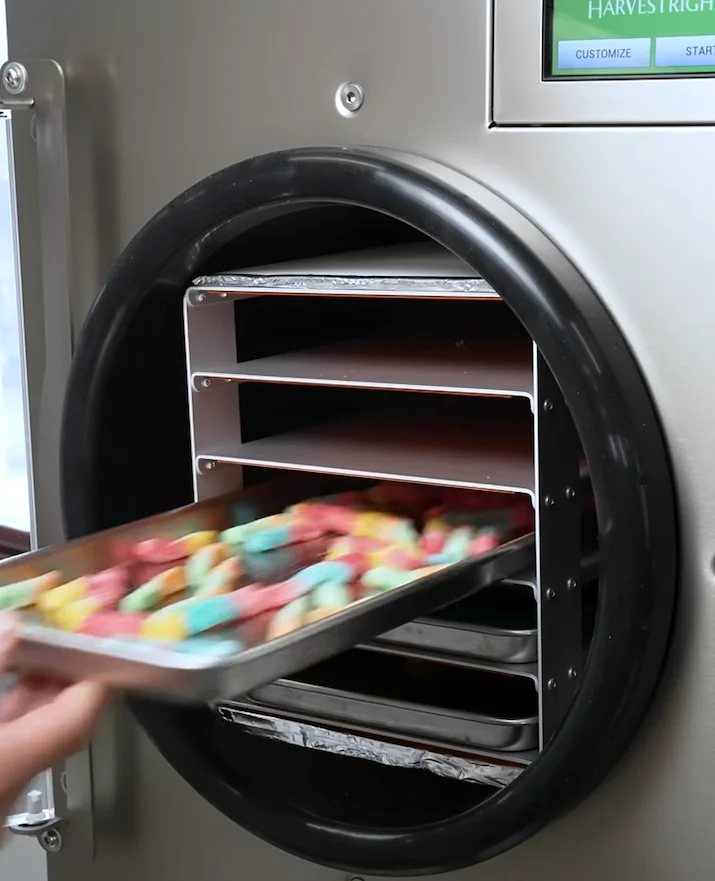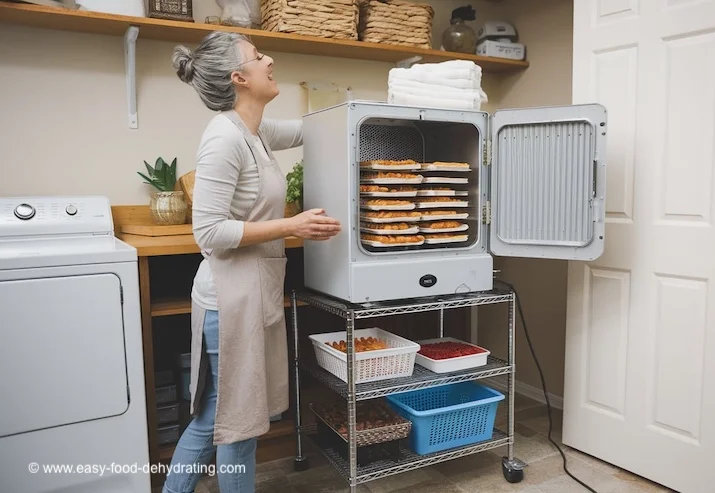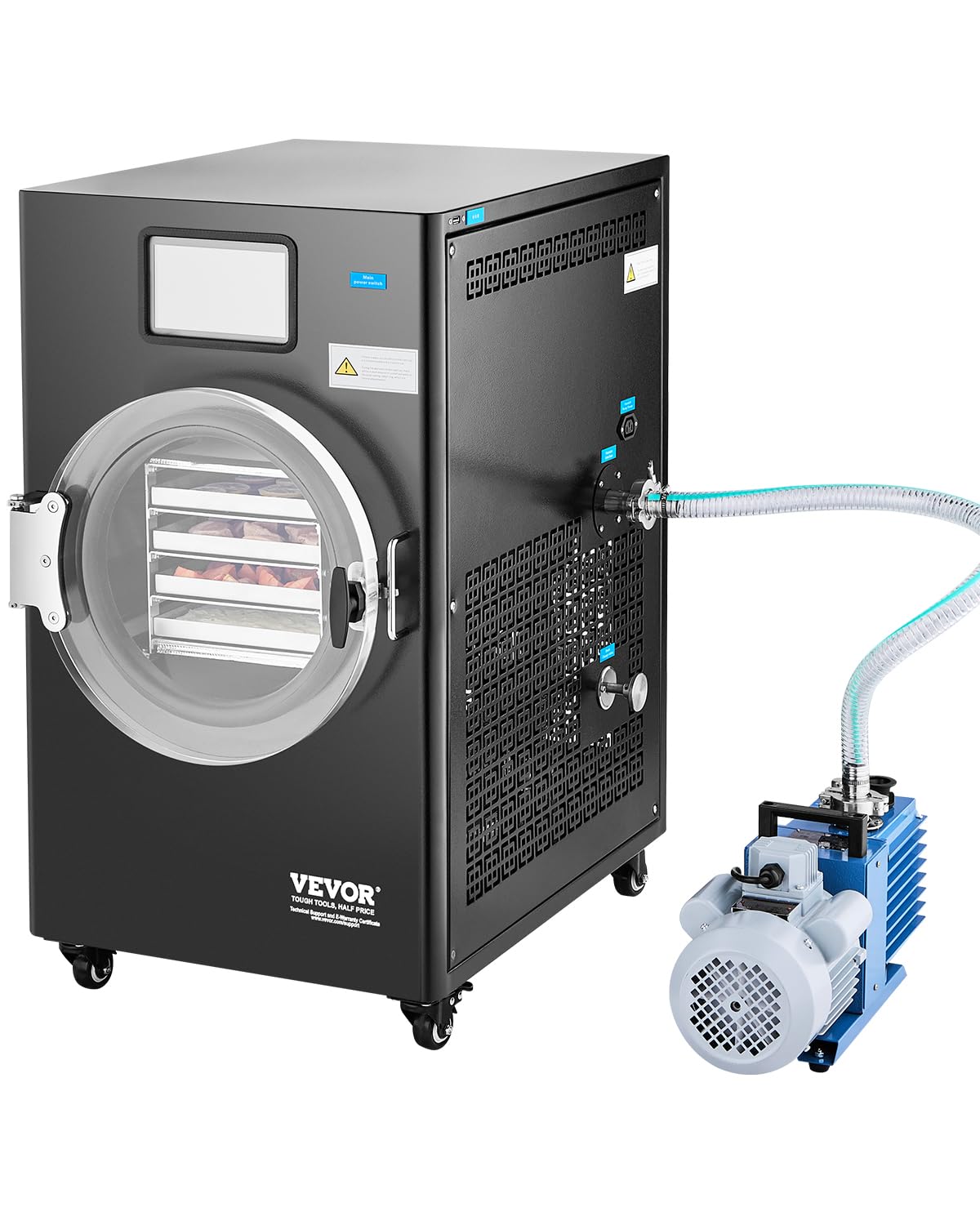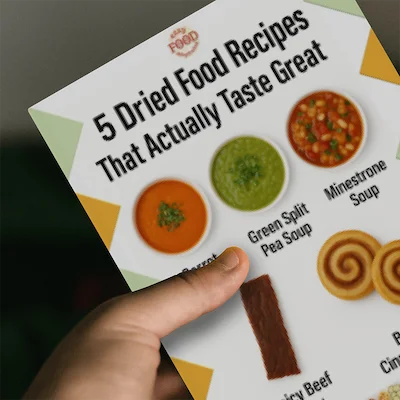What We Mean by “Dehydrate”
Here at Easy Food Dehydrating, “dehydrate” always means using an electric food dehydrator — the easy, reliable way to dry food at home.
- Home
- What Are Food Dehydrators
- Home Freeze-Dryer Cost
- Can a Food Dehydrator Freeze-Dry Candy? Here’s the Truth
Can a Food Dehydrator Freeze-Dry Candy?

Exploring Sweet Preservation Options
If you’re asking can a food dehydrator freeze-dry candy, you’re not alone—I tested and researched this so you don’t waste time (or sugar!). Below is the quick answer, what your dehydrator can do, and how to get those big, puffy, crunchy results people love.
✅ Quick Answer: Can a food dehydrator freeze-dry candy?
No. A dehydrator uses heat and airflow; freeze-drying needs sub-zero temps and a vacuum so ice sublimates. To make true freeze-dried candy you need a freeze dryer. Your dehydrator can crisp some candies, but texture and expansion won’t match real freeze-drying.
 Food Dehydrator vs Freeze Dryer—only one can make true freeze-dried candy.
Food Dehydrator vs Freeze Dryer—only one can make true freeze-dried candy.Dehydrator vs. Freeze-Dryer: What Your Candy Can (and Can’t) Do
While a food dehydrator removes moisture from candy, it cannot truly freeze-dry candy in the same way as a specialized freeze-dryer can.
Freeze-drying requires very VERY low temperatures and a vacuum environment. Standard home dehydrators cannot provide freeze-drying at all, as they work the opposite way around - with heat!
 Screenshot of a Harvestright Freeze Dryer via Nick DiGiovanni taken from his video, coming up!
Screenshot of a Harvestright Freeze Dryer via Nick DiGiovanni taken from his video, coming up!And be very, very careful what you see on Amazon. I was checking them out and some sellers/manufacturers titled their products as "Freeze Dryers" - and their temperature ranges stated in their descriptions never went to freezing or below-freezing!
However, dehydrating candy can create interesting textures that are similar in some ways to freeze-dried candy.
I'll cover the differences between dehydrating and freeze-drying candy, what results you can expect from a food dehydrator, and some tips for getting the best outcomes.
Freeze-Drying vs. Dehydrating: What's the Difference?

Freeze-drying food and dehydrating food are two distinct methods of removing moisture from food. Both processes have unique characteristics that do affect the final product's texture, flavor, and shelf life.
How Freeze-Drying Works (Plain-English Sublimation)
Freeze-drying (aka lyophilization) preserves food by pulling out up to 98% of its water. The process starts by freezing the food rapidly, then placing it in a vacuum chamber. The frozen water then changes (which is called sublimation) from ice to vapor, bypassing the liquid phase!
Because nothing melts, the food keeps its structure and most of its nutrients. It’s fantastic for delicate treats like fruit and candy: same flavor profile, but now with a light, crispy crunch. In that first video above, you’ll see some pieces really puff up!
A true freeze dryer runs at very low temps—around −30°F (−34°C). You need that specialized equipment to make sublimation happen. It’s not a DIY project unless you’ve got a proper unit, like a Harvest Right.
Why Dehydrators Can’t Freeze-Dry (Heat vs. Vacuum)
Dehydration is a far simpler drying process that uses heat and air circulation to remove moisture. We CAN use a food dehydrator (or even a regular oven) to get a freeze-dried texture for candy.
Unlike freeze-drying, dehydration typically removes about 90-95% of the water content. It works well for many foods but can alter texture and flavor more significantly than freeze-drying.
How so?
Dehydrating:
- Heat breaks down cell walls, making food tougher or chewier
- Flavor is also lost during dehydration as it evaporates along with the water!
Freeze Drying:
- Cells stay intact because the ice crystals sublimate without melting
- There's no heat exposure really, so less chemical reactions occur and the flavors stay in place!
While both methods are used to preserve food in general, freeze-drying is obviously far superior for creating freeze-dried candy.
Having said that, dehydration is more accessible and affordable for home use for fruits, veggies, meats, and more!
Why Candy Puffs Up—The Freeze-Dry “Popcorn” Effect

When freeze-drying candy, it preserves sweet treats and is "a cool way" (pun intended) to remove moisture. Freeze-drying creates a lightweight, crunchy version of our favorite candies!
Crunch Without Melt: Texture + Flavor Wins
Freeze drying candy pretty much maintains its original shape and intensifies its flavor. Hard candies become airy and crisp, while gummy bears turn into crunchy, melt-in-your-mouth delights.
This method preserves the candy's structure and concentrates its taste. Sour candies often become even more tangy after freeze drying.
98% vs 90–95% Water Removal: Shelf-Life Reality
The freeze-drying process can keep treats fresh for months or even years.
When we remove moisture by either dehydration or freeze-drying, bacteria and mold's growth are inhibited significantly, which naturally preserves the candy.
As the water is removed, the candy's flavors become concentrated, resulting in a more intense taste.
Properly freeze-dried candy can be stored at room temperature in airtight containers such as Mason jars, or airtight tubs. This is great for long-term storage or as a lightweight snack when backpacking, for instance.
Want True Freeze-Dried Candy? Do It the Right Way
Before freeze-drying, prepare the candy properly. Start by choosing fresh, high-quality candies like gummies, caramels, or Skittles. It's important to choose candies that aren't too sticky - or oily.
Clean and sort the candies, removing any damaged pieces. Eat those now! LOL.
Next, arrange them in a single layer on the freeze-dryer trays, leaving a tad of space so they don't touch - or stick - to each other. Then follow the manufacturers instructions on how long to freeze-dry your candy.
Gear Check: What You Actually Need to Freeze-Dry
 Not a real brand of freeze dryer - shown for illustrative purposes only.
Not a real brand of freeze dryer - shown for illustrative purposes only.Thinking of Buying a Freeze Dryer? Read This First
When choosing a freeze dryer for candy, consider the size,
its capacity, and all the features it has. And again, make SURE it is a TRUE Freeze Dryer!
Home freeze dryers are typically bigger than a dehydrator and grow in size to larger floor units. Check out my guide here, if you haven't done so already.
Key features to consider:
- Adjustable temperature settings
- Digital display for monitoring progress
- Automatic defrost function
- Vacuum pump quality
You might want to use a tray liner that helps stop sticky or sugary foods from sticking to the trays. Usually the liners are silicone mats or trays sold by the manufacturer.
Some people simply use parchment paper as liners.
Keep the Crunch: Best Uses + Storage That Works
Freeze-dried candy is ideal for snacking, travel,
and storage - and you can impress your friends with your fancy treats.
Sweet Ways to Use It (Toppings, Mix-Ins, More)
Think about crushing freeze-dried candy into powder and sprinkle on top of desserts. It adds a burst of flavor and a crackly texture to ice cream, cakes, and cookies!
For a quick energy boost, mix freeze-dried fruit candies into trail mix or granola. The light, crispy pieces blend perfectly with nuts and dried fruits.
Travel & Trail: No-Melt Snack Packs
Portion freeze-dried candies into small Ziploc bags for easy snacking on the go. They're perfect for long car rides or flights, as they won't melt or get sticky.
For outdoor activities, think about mixing freeze-dried candy with nuts and seeds (as mentioned earlier) to create a custom energy mix. It provides a quick sugar boost during strenuous activities.
Short- vs Long-Term Storage: Jars or Vac Bags?
Always store your freeze-dried goodies in airtight containers. This helps keep out the moisture in the air and preserves your candy's unique texture.
Consider using food vacuum-sealer bags as they work exceptionally well for long-term storage. They keep out air and moisture, further extending the candy's shelf life.
For pantry organization, label your containers that store different types of freeze-dried candies. Add the date too! This makes it easy to see what's what and grab the right treat quickly.
VEVOR Freeze Dryer Available on Amazon
VEVOR Vacuum Freeze Dryer Machine
This freeze dryer has room for up to 13 pounds of food on four sturdy trays.
It handles big batches of meat, veggies, or fruit with ease.
The vacuum freeze-drying process keeps flavor, texture, and nutrients intact so meals taste fresh for years.
Easy-to-use touchscreen and let it do the work. You can even peek through the clear acrylic door to watch the process.
Quiet, energy-efficient, and built to last, it’s the kind of investment that pays you back with convenience, nutrition, and peace of mind.
As an Amazon Associate, I earn from qualifying purchases — this does not affect the price you pay. Read full disclosure.
NOTE: When you do research on Amazon, make SURE it is true FREEZE DRYER. I saw a LOT of models claiming to be Freeze Dryers, but when you see their temperature range is 86°F to 194°F, you know that is nowhere near freezing! (32°F)
Candy + Dehydrator Myths, Debunked (FAQs)
Freeze-drying candy at home raises many questions about the process, equipment, and results. Here, I'll address common questions about freeze-dried sweet treats.
Can a food dehydrator freeze-dry candy?
Can a food dehydrator freeze-dry candy?
No. Dehydrators use heat and airflow. Freeze-drying needs sub-zero temps and a vacuum to sublimate ice. Different machines, different outcomes.
Why do some freeze-dried candies puff up so much?
Why do some freeze-dried candies puff up so much?
Water trapped inside turns directly from ice to vapor under vacuum, creating pores and expansion—hello, big puffy pieces.
Can I “fake” freeze-drying by dehydrating first and then freezing?
Can I “fake” freeze-drying by dehydrating first and then freezing?
No. Freezing alone doesn’t create vacuum; without vacuum you won’t get sublimation or that porous, airy crunch.
Which candies dehydrate okay in a regular dehydrator?
Which candies dehydrate okay in a regular dehydrator?
Thin fruit leathers, some hard candies, and certain sugar candies can crisp somewhat—but expect less puff, more chew.
Best candies for true freeze-drying?
Best candies for true freeze-drying?
Gummies, marshmallows, taffies, and some fruit candies. They expand, dry evenly, and deliver that light, crackly bite.
How do I store freeze-dried candy to keep it crunchy?
How do I store freeze-dried candy to keep it crunchy?
Cool, dark, airtight. For short term, sealed jars work. For long term, use vacuum-sealed bags or oxygen-controlled jars.
Are all “home freeze dryers” legit?
Are all “home freeze dryers” legit?
Look for sub-zero operating temps and a vacuum system. If a product’s “freeze dryer” spec only lists warm temps (e.g., 86–194°F), it’s not a freeze dryer.
Now you’ve got the real answer on dehydrators vs. freeze-dryers—and how to dodge misleading listings.
If you want some easy, genuinely tasty wins next, grab the free 5 Dried Food Recipes You'll Actually Love PDF (below). You’ll get quick favorites like carrot soup, minestrone, split pea soup, spicy beef jerky, and banana cinnamon rolls. Yum!
Get 5 Dried Food Recipes You'll Actually Love
Here's where you can get your copy of our all new
5 Dried Food Recipes (That Actually Taste Great)
They're my all-time favorite easy dried food meals!
Get it here right now.
For Free!
Before You Go...
If you enjoyed this page, tap the ❤️ in the lower right-hand corner.
It saves this page to your Grow bookmarks so you can find it again later.
You’ll also see quick share buttons to copy the link, post to Facebook,
or save it straight to Pinterest.

















